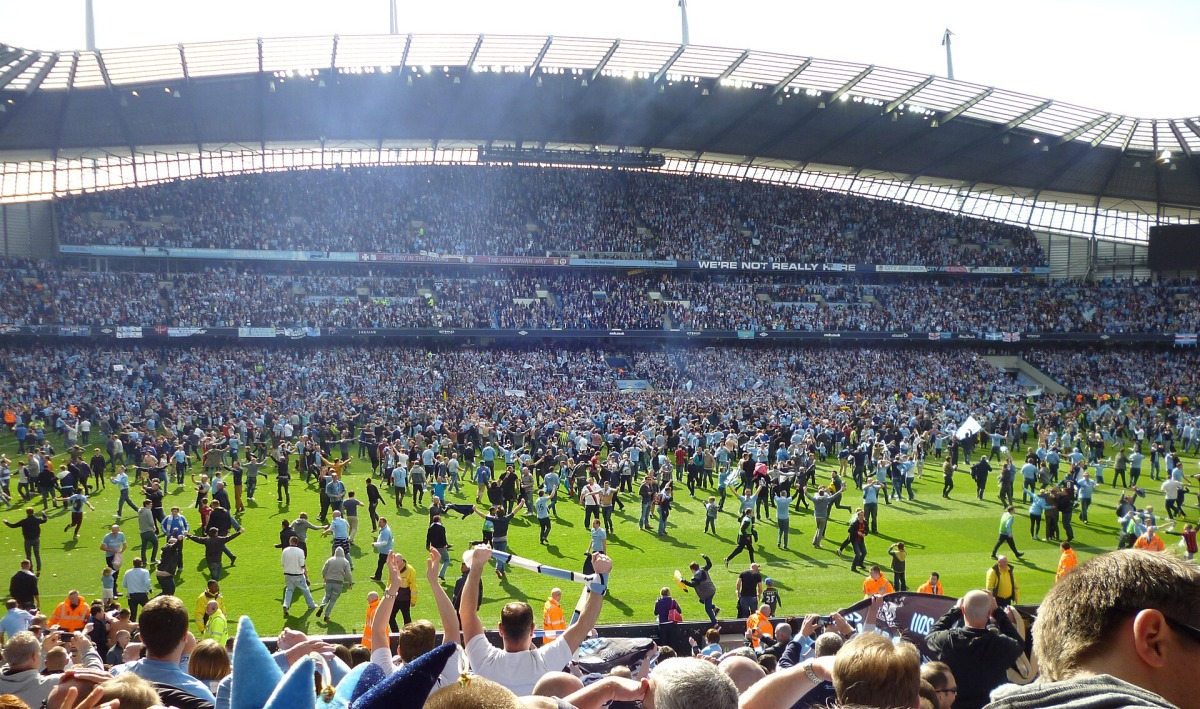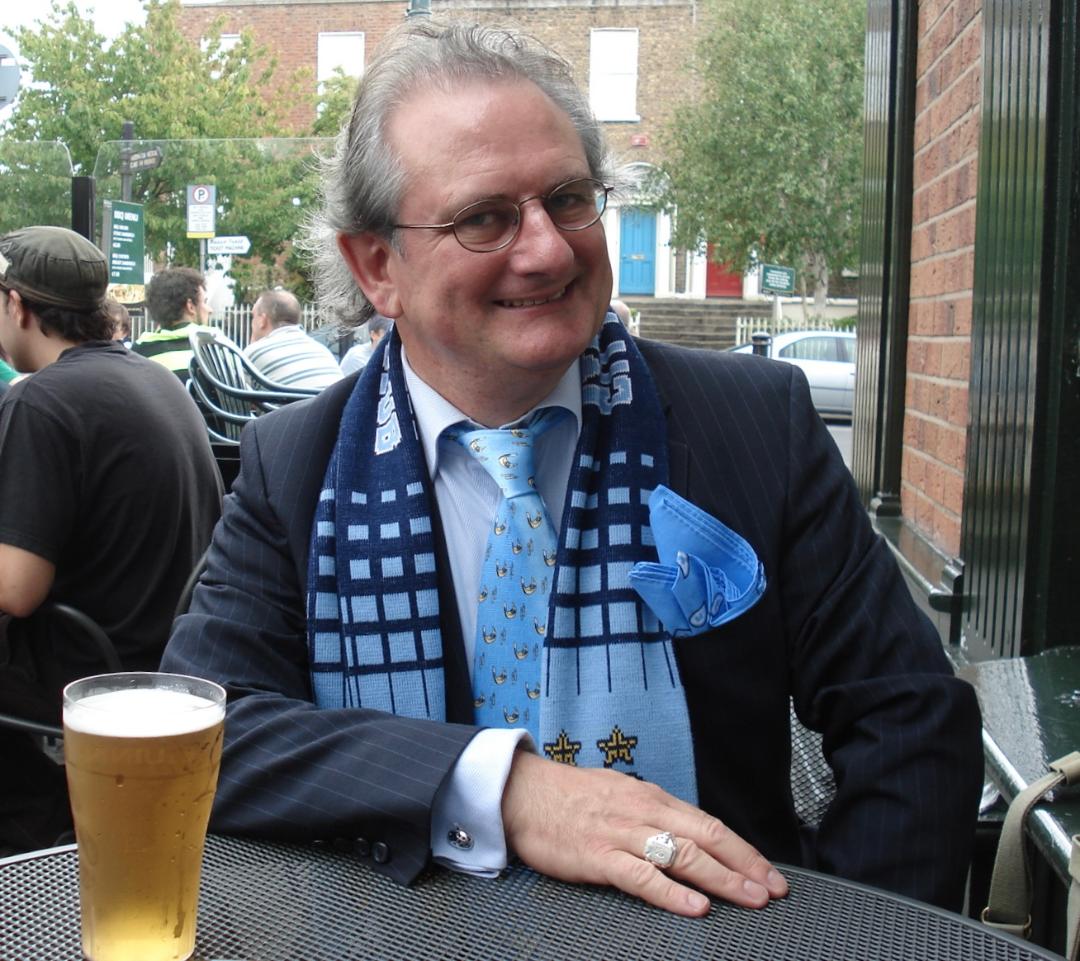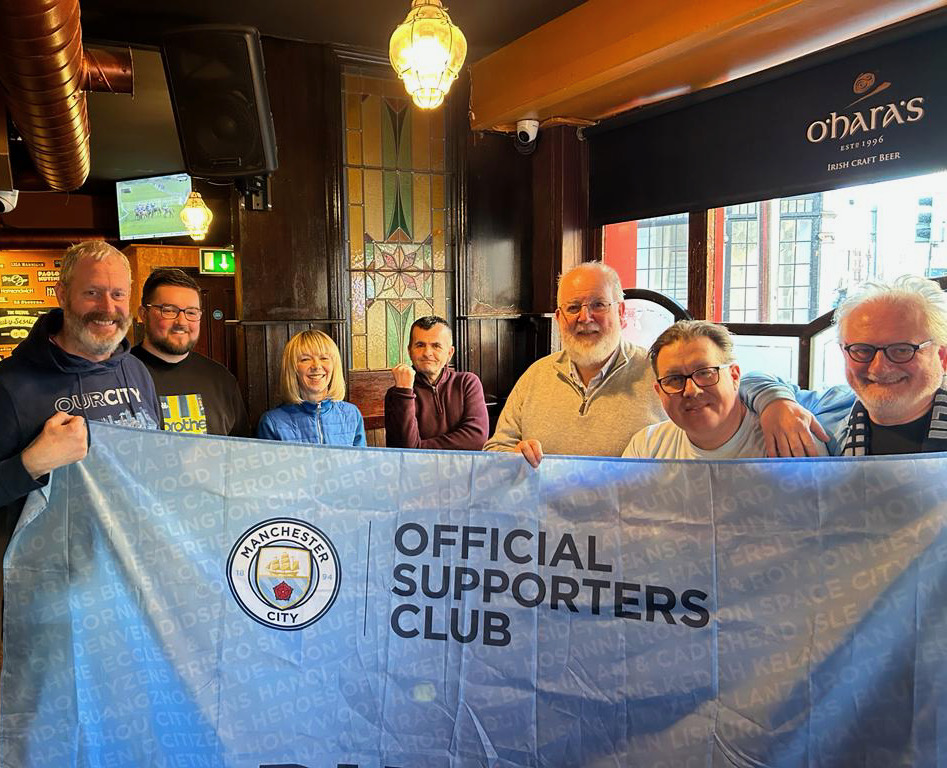In the final part of his essay on the joys and woes of being an Irish Manchester City fan, Desmond Traynor delves into psychological and emotional reasons for sustaining sporting allegiances, through thick and thin.
Even if nothing in the foregoing fact-based rant convinces City-sceptics, it is not the main plank of my justification for my continuing City fandom. Facts don’t care about your feelings; but, equally, feelings don’t care about the facts. Support for City, or any sporting association, is an unchanging and unchallengeable tribal loyalty – it is instinctual. Economics is science, albeit it a dismal one – it aspires to rationality. These impulses speak to very different parts of our nature as human beings. Despite the discipline designation ‘Political Science’, politics is where instinct and reason try to intersect – and usually fail. The personal is political; but the political is also personal. My love for City is emotional – like the feelings of fans of any other sports club – and I will present the facts to suit my feelings as much as they do, because I love every single bedbug in the mattress I’ve chosen to lie on as much as they love whatever bloodsuckers are infesting theirs.
My hero Michel de Montaigne wrote: ‘Mistrust a man who takes games too seriously; it means he doesn’t take life seriously enough.’ Perhaps this is true. But, then, it means there are an awful lot of people (and not only men) who don’t take life seriously enough – myself included. Noam Chomsky goes further in his criticism of sport. In one interview in his book Manufacturing Consent: Noam Chomsky and the Media (1988), the linguist and social commentator asserted that sport is one of the means by which capitalist ‘special interests’ that dominate government control public opinion, providing a distraction from more important and meaningful matters, after the manner of Roman ‘Bread and Circuses’ (food and entertainment) to mollify the unwashed masses. However, it is worth noting that Chomsky’s analysis was formulated before English football, as the late lynchpin of Manchester musical legends The Fall and lifelong City fan, Mark E. Smith, put it, ‘went middle class’, with all-seater stadiums replacing the terraces of old because of health and safety concerns following several crowd disasters at matches, the formation of the Premiership to replace the League and the Champions League to replace the European Cup, and the sale of television rights to the highest bidder (predominantly Rupert Murdoch’s Sky TV) – all accompanied by the concomitant rise in ticket prices to the exorbitant levels of today. What was once a boozy day out for a bunch of lads is now fireside family entertainment, or an adventure in corporate hospitality. Granted, many of those enjoying the Thatcherite dream of ‘everyone his own home-owning, sole-trading, small business operating entrepreneur’ middle-class heaven may have sprung from working-class backgrounds, but they could have chosen to spend their new found disposable income elsewhere.
Besides which, such reductive critiques ignore the sublimatory social functions of sport. After all, battling each other on a soccer pitch, even in a particularly dirty game, is better than waging all-out war between countries. For example, for many nationals of both nations, England’s 4-2 victory over West Germany in the 1966 World Cup final signalled the real end of the Second World War. (It doesn’t always work, of course: football as metaphor for war can occasionally turn into actual war. As every schoolboy knows, the immediate casus belli for the so-called 1969 ‘Soccer War’ between El Salvador and Honduras was the two-legged World Cup qualifier and subsequent play-off the two countries played against each other, in preparation of the 1970 World Cup hosted by Mexico. But, in truth, longstanding tensions already existed between these two small and very poor Central American countries. For more than a century they had been accumulating reasons to distrust one another. Each had always served as the magical explanation for the other’s problems. Hondurans have no work? Because Salvadorans come and take their jobs. Salvadorans are hungry? Because Hondurans mistreat them. Both countries believed their neighbour was the enemy, and the relentless military dictatorships of each, forged at a U.S. factory called the School of the Americas, did all they could to perpetuate the error. El Salvador suffered about 900 mostly civilian dead. Honduras lost 250 combat troops and over 2,000 civilians during the four-day war.) Here, I cannot help but succumb to the temptation to quote one of former Liverpool manager (from 1959 to 1974), the late, great Bill Shankly’s most famous pronouncements: ‘Some people believe football is a matter of life and death, I am very disappointed with that attitude. I can assure you it is much, much more important than that.’
Football is a serious business, then, for many. But what differentiates City fans from those of sundry other clubs, in my opinion, is that we retain an ability to see the funny side, to laugh at ourselves. Apart from their ubiquity, my other chief gripe against supporters of Liverpool and Manchester United is their ingrained sense of entitlement. They take it very seriously. Despite City’s accumulating successes over the past ten years, I cannot as yet detect the slightest note of triumphalism among our fanbase. Sure, we like to indulge in ‘the bants’ (as it is abbreviated) as much as the next person with a strong affiliation, a practice posh people call ‘schadenfreude’ but which is known locally by the more colloquial term ‘slagging’. While this practice can degenerate into mere trolling, that is largely a matter of perspective, as to how seriously one takes the banter. Where is the line, and when does it get crossed? Irish practitioners of the two major English footballing religions seem especially quick to take offence. But then, they are fundamentalists, who follow the one true faith. If you are looking for an illustration of real, blatant, vicious trolling, there used to be a banner United fans would unfurl across the Stretford End at Old Trafford for every single home match, in the form of a mock digital clock, a wind-up to commemorate the number of years their cross-town neighbours – us – had not won a trophy. This ticking Date/Time reminder was finally retired in 2011, with the notch stuck between 34 and 35, after we lifted the FA Cup v Stoke.

Manchester City supporters invade the pitch following their 2011–12 Premier League title victory.
Underhand Spying
Worse than trolling was stealthy, underhand spying, as exemplified by Liverpool FC employees allegedly hacking into City’s scouting platform in 2013, to gain access to its database, resulting in an out-of-court settlement of £1m being paid by Liverpool to Manchester City – without any admission of guilt. Worse than that again was the attack by Liverpool supporters on the Manchester City team coach in 2018 (‘Let’s show them what money can’t buy’ ran the rabble-rousing rallying cry on their social media groups) as it made its way to Anfield for the Champions League quarter final first leg. Bottles, coins, flares and cans were thrown by home fans, rendering the City bus ‘unusable’ for the return journey. All the while the Liverpool Metropolitan Constabulary – who publicised the route the bus would take in advance – were noticeably uninterested in intervening in any potential standoff between supporters of either club, or in bringing any of the perpetrators of this criminal activity to justice. Liverpool FA were subsequently fined a paltry £20,000 by UEFA on foot of the incident.
City was, and is, a club with a heart and a sense of humour, which is often turned on itself for good measure. They say we have ‘no history’. But every football club in existence has a history, from Grimsby Town to Leyton Orient to Wycombe Wanderers to your local GAA Under-15s squad. What they really mean is, ‘you have no history of winning big, important competitions’ – an approach curiously akin to the ‘great men’ methodology of historiography. Yet, as outlined above, even that is not true either, as we have won League titles and Cups in the past. As with most history, it all depends on how far back you want to go. Granted, no matter how far into the distant past you care to venture, until recently we’ve had no history in the European Cup/Champions League, as they are constantly fond of reminding us. So what? Neither have Arsenal or Spurs or Newcastle United. Nor Grimsby.
We are an eccentric club, to be sure, with a neat line in self-deprecation – something I didn’t know when I became a devotee aged seven, but which I find is congruent with my personality now. Helen Turner, a flower-seller outside Manchester Royal Infirmary, would sit in the front rows of the North Stand and offer Joe Corrigan a sprig of lucky heather before every game, and then thunder her bell every time City won a corner. In 1978 the club bought Kaziu Deyna, the Polish World Cup captain, for a consignment of toasters and fridges, a deal arranged by electrical goods magnate and megalomaniac chairman Peter Swales. Someone once stumbled onto the away terrace at West Brom with an inflatable banana and, within weeks, there were thousands of them at every game, joined by paddling pools, crocodiles and fried eggs. (Such playthings have long since been banned by the F.A. as a health & safety hazard. It’s not the same in an all-seater stadium anyway.)
Poznan
Then there is our adoption of the Poznan, a celebratory dance which involves supporters turning their backs to the pitch, linking arms and jumping up and down while singing favourite songs or chanting in unison. It all began in 2010, when City were playing in the same Europa League group as Polish side Lech Poznan, who came to the City of Manchester Stadium on October 21st of that year. Throughout the game the Poznan fans impressed with their noise, organisation and creativity. While City fans were initially unimpressed with the backs-turned bounce, they were gradually won over and soon appropriated it as a mark of respect. The Poznan supporters are still widely thought to be among the best away fans ever to have visited Eastlands. We acknowledge the debt by retaining the name. Now we ‘break out the Poznan’ when we score, or simply when we are dominating play. The explanation – if one is needed – seems to be that it is done in order to taunt the opposing side, as much as to say, ‘Our team is so good that we don’t even need to watch what is happening: we know we’ll win.’
If more evidence is needed that nothing is quite as appealing to City fans as the irreverent and the absurd, consider some of our oldest terrace chants. For example, ‘We never win at home and we never win away/We lost last week and we lost today/We don’t give a fuck/’Cos we’re all pissed up/MCFC OK’ did sterling service when we were ‘down among the dead men’. Another song of denial, Camusian in its sense of existential dread, was, ‘We are not, we’re not really here/We are not, we’re not really here/Just like the fans of the Invisible man/We’re not really here’ (sung to the tune of ‘We Shall Not Be Moved’). Various myths circulate about the origin of this one. Some say it began at Luton Town in the 1980s, when away fans were banned, while others claim it was a reaction to media claims that City had no fans. Another story is that the City fans who defied the ban on away fans at Millwall’s notorious Den began singing it after managing to sneak into the ground – although it is unlikely anyone who did that would survive to tell the tale. At first it was a fitting reflection on the woes and misfortune of the old City, a big club that found itself wallowing in the murky depths of English football. But in the last ten years it has metamorphosed into an ode to hope and joy, an expression of incredulity at the transformation wrought at the club by Sheikh Mansour’s takeover. Again, equally an expression of chronic insecurity as an affirmation of fragile or grounded identity, there is, ‘I’m City till I die/I’m City till I die/I know I am/I’m sure I am/I’m City till I die.’ Like a character from Samuel Beckett’s work, the verbal reiteration might just make it true, even if you’re not so sure. Then there is our official club anthem, the Rodgers and Hart standard, ‘Blue Moon’. With its narrative trajectory over three short verses and a bridge from the yearning loneliness of searching for ‘Someone I really could care for’ to finding ‘The only one my arms will hold’ and the Blue Moon turning to gold, it would seem perfectly to encapsulate City’s recent journey – although it was adopted as long ago as 1989. The fact that the first verse is sung as a slow-tempo forlorn ballad and the second verse speeded up to the breakneck pace of hardcore punk adds to the sense that it represents a reversal of fortunes.
Finally, mention must be made of that recurring two-word phrase which has become a byword among City fans for the club’s travails: ‘Typical Citeh’. The Urban Dictionary sums it up well: ‘When Manchester City somehow mess up an easily winnable situation and everyone is disappointed but not surprised.’ We have never done it the easy way. Even the Agüero moment was ‘Typical Citeh’ after a fashion, although on that occasion we just about managed to win. It may have less currency now, yet it is part of the fabric of Manchester City, because it is living and breathing in every single one of the fans who can remember anything before 2010.
Sadly, there is a feeling that, mixed in with all this hilarity, it was a product of a time when City had become a joke team. Fans of other clubs generally warmed to us, but there was a sense in which they were just patronising the lovable-losers. We were told we had a great sense of humour – a humour that was used, as so much humour is, to hide massive hurt – but secretly they were laughing at us, not with us. Well, no one is laughing now. Except City fans. They liked us when we were struggling. They don’t like us now that we are strong.

Dublin Branch
I have been a member of the Manchester City Supporters Club – Dublin Branch since 2011. Prior to that, I had thought I was ‘the only City fan in the village’. But the branch, founded in 1975, currently has 104 members, and there are other branches all over the country. A quick Google search helped me to unearth it – social media is useful for something. We meet every three weeks on a Monday evening in an upstairs room in a city centre pub. Apart from the social interaction, the branch is mainly a focal point for topping up one’s account and ordering match tickets – although, post-Covid, these functions have gradually shifted online. We travel to matches together, organise trips and social outings, yak about City. I enjoy the comradery. It is an egalitarian freemasonry – guys help relative strangers out, with lifts, loans, mortgages, that sort of thing, like any other mutual benefit society – with a conducive absence of petty politicking, where the only qualification for acceptance when you walk through the door is that you support City. (Liverpool-loving Declan Lynch is still welcome to visit, if only for research purposes.) You meet people from all walks of life, whom you might never encounter elsewhere. The brain surgeon mingles with the binman, the senior civil servant with the rank-and-file bank or post office clerk. Plus we have your usual quota of cops and taxi-drivers, your ex-cops who are now tax-drivers, or freelance ‘security consultants’. We have an accountant, a chef, and a postman (who used to be a car salesman). We even have déclassé, would-be literary intellectuals like myself. We are prepared for every eventuality.
My feeling of welcome and at-homeness in the Supporters Club is all the more noteworthy because I am not, and have never been, a great joiner. Also, I tend to lack a competitive spirit. (Maybe I was more driven, once upon a time, but I can’t remember.) But I admire it in others – at least when there is something tangible at stake, be it as arbitrary as club affiliation, national pride, even individual will. As an inveterate observer, I am fascinated by people of action and ambition, probably because they seem to be animated by a force that I do not possess.
In Crowds and Power (1960) Elias Canetti explored the recurring battle between individuality and the urge to lose ourselves in crowds. He writes:
A crowd isn’t just a large number of people – it’s a mass in which members identify with one another. When that happens, people enter into something that’s greater than the sum of their individual parts: a crowd. In that moment, there’s a sense of equality. Every member enjoys the same standing, regardless of previous differences.
Attendees at football matches and music concerts are more than familiar with this feeling. It is the same impulse which motives religious people to undertake pilgrimage so they can gather to be present at Mass offered by the Pope in St. Peter’s Basilica in Rome, or to go on Hajj so they can circle the Kaaba in the Al-Masjid Al-Haram Mosque in Mecca counter-clockwise seven times, in both cases blending in and losing themselves in the throng of their fellow faithful. Some may even be aware of the great paradox at the heart of such gatherings: how many times have we heard popular singers on stage in a large auditorium or stadium exhorting tens of thousands of their hysterical fans to ‘embrace their individuality’ and ‘just be themselves’? Canetti continues:
Only together can men free themselves from their burdens of distance; and this, precisely, is what happens in a crowd… Each man is as near the other as he is to himself; and an immense feeling of relief ensues. It is for the sake of this blessed moment, when no-one is greater or better than another, that people become a crowd.
Musicians, too, are cognisant of this transcendent feeling – not only in witnessing the euphoria of the audience, but also in the experience of playing with their peers. It may not happen often, but occasionally all egos dissolve in the performance of a piece, as it comes to seem that the music is playing itself rather than being executed by each individual participant. As with team sport when enacted with unselfconscious fluidity, it becomes a synergistic endeavour where everyone contributes to achieve something which is not only beyond what they could produce by themselves, but much more than what the ensemble could be expected – on paper – to realise as a functionally competent unit. Alas, this form of collaborative creative magic is one to which solitary writers are not privy.
And so, I can understand the desire to gather, to club together, to compete, and to win (if only voyeuristically and vicariously) – even if, for me, it is largely confined to my support for a football club I was attracted to before I could rationalise my attraction to it. What I share with my fellow countrymen and women who are fans of Liverpool and Manchester United, and any other instance of the Not-Manchester City, is not only our common humanity, but the fact that we all have a passion. They have just chosen different – if more popular – sides in the pursuit of the same goal: the ecstasy of being part of a winning crowd.
We are all party to the truth of group sport: when the tedium vitae hits, even when you think you’ve lost everything, even when you have lost everything, when you are at the lowest of your lows (as well as the highest of your highs) there is always your team, and your fellow supporters. As a means of developing a social network, and sometimes life-long friendships, it seems relatively benign. Even if, at least for the time being, my team is magic and yours is rubbish, or not as good as ours. In Ireland, you may be many, and we are few. But I realise that all I am really saying here is that, due to a penchant for independent thinking, my group affiliation in this land is more uncommon and less of a legion than your group of choice – and therefore partakes of the cachet that derives from esoteric exclusivity. My support betokens more rugged individualism than yours, which is, or was – relatively speaking – an easier route to glory. You just want to be on the side that’s winning, and for a long time you were. So, deep down, did we; and now, surprisingly, we are.
So there: I have removed my fig leaf, transformed it into an olive branch, and am offering it to all of you now. Let us practice peaceful coexistence.
All empires crumble. For my part, I hope City’s reign lasts for a thousand years. It won’t, of course. Is there any need to quote Shelley here?
And on the pedestal, these words appear:
My name is Ozymandias, King of Kings;
Look on my Works, ye Mighty, and despair!
Nothing beside remains. Round the decay
Of that colossal Wreck, boundless and bare
The lone and level sands stretch far away.
But should City someday in the not so distant future wind up back in the Championship, or worse, League 1, stripped of every trophy we have won over the last decade, with all our star players hotfooting it to the exit doors for clubs where they can compete for top honours (and earn wages comparable to what they now rake in) – because we have been adjudged guilty of one or more of the infamous alleged 115 breaches of Financial Fair Play rules against us – I for one, and many others, will still be following them. To reiterate: I was there when we were shit. And I’ll be there again if we are shit again. Blood is thicker than principle when it comes to football. Your team is your team is your team, as much when it embarrasses or shames you as when it delights and gratifies you. How could I walk away from my team after all these years? Remember those words again, previously sung with shy ambivalence, now with full-throated force: ‘I’m City ’til I die/I’m City ’til I die/I know I am/I’m sure I am/I’m City ’Til I Die.’ And, who knows, maybe even after that.
And that is how I can be Red-as-they-come politically, but when it comes to football, ‘once a Blue, always a Blue.’




